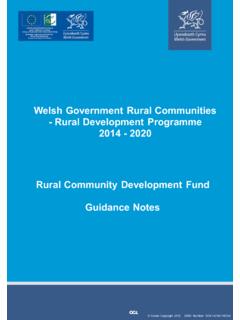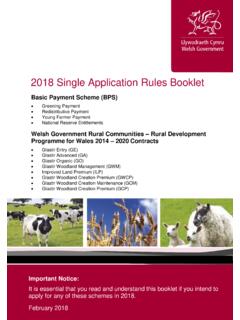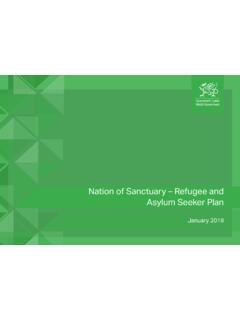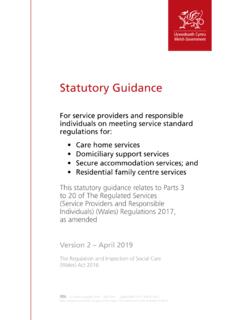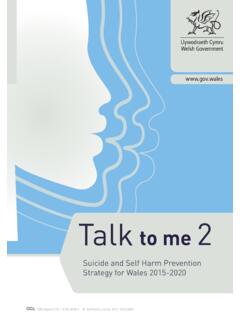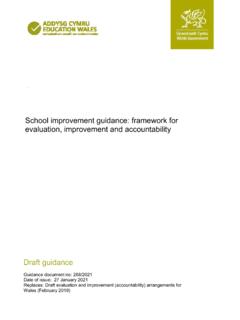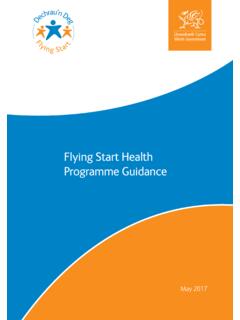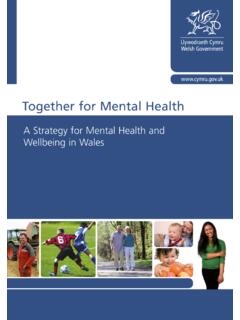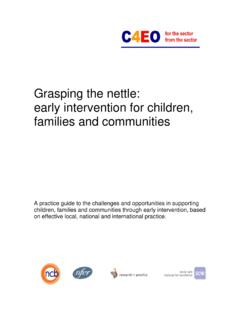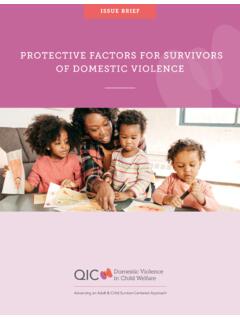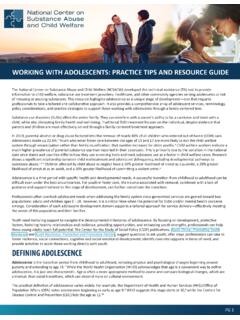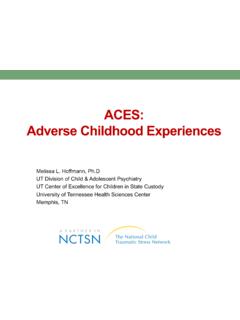Transcription of Families First Programme Guidance - GOV.WALES
1 Families FirstProgramme GuidanceApril 2017 Crown copyright 2017 WG30772 Digital ISBN 978 1 4734 9290 5 Mae r ddogfen yma hefyd ar gael yn document is also available in Welsh. Families First Programme Guidance April 2017 Audience All those involved in the design, commissioning and delivery of services funded through the Families First Programme , including Families First Coordinators, local authority service leads and delivery partners across all relevant sectors. Overview This non-statutory Programme Guidance has been produced in partnership with local authorities and key stakeholders and replaces the previous document, Families First : Programme Guidance (As at October 2011). The purpose of this Guidance is to enable local authorities and their partners to understand Families First , its purpose and key aims, and sets out the Welsh Government s expectations in relation to Programme delivery.
2 This Guidance relates solely to the delivery of the core elements of the Families First Programme . Separate Guidance is available which sets out the Welsh Government s expectations in relation to financial matters and data collection and performance management. Action required This Guidance must be used to inform the design and delivery of all services funded through the Families First Programme . Further information Enquiries about this Guidance should be directed to: Families First Policy Team Children and Families Division Welsh Government Cathays Park Cardiff CF10 3NQ Email: Additional copies This document is only available in digital format. Related documents Families First Performance Management Framework Guidance : April 2017 Families First Financial Guidance Families First Programme Guidance (As at October 2011) Contents Page 1 Policy context 1 Welsh Government policy 1 Adverse Childhood Experiences 1 United Nations Convention on the Rights of the Child 2 2 Introduction to Families First 3 What is Families First ?
3 3 What is early intervention? 3 What do we want Families First to achieve? 4 Families First principles 4 Where does Families First sit on the continuum of support? 5 Relationship with other plans and programmes 6 Assessing the needs of populations 7 3 Delivering the key elements of Families First 8 Joint Assessment Framework for Families 8 Team Around the Family 9 Disability Focus 11 Strategic commissioning 12 Commissioning effective services 13 Learning sets 14 4 Strategic commissioning parenting 15 What is parenting ? 15 How can Families First support parents? 15 Core aims of parenting support 15 Themes of support 16 Age-related themes 17 Cross-cutting themes 18 What types of support should be delivered? 21 Priority groups 22 Who needs to be involved? 26 Engaging Families 27 Monitoring interventions 29 5 Strategic commissioning Support for young people 31 Why should Families First provide targeted support to young people?
4 31 Core aims of support for young people 32 What is the age focus of support for young people? 33 Identifying the needs of young people 33 Who needs to be involved? 34 How should support be delivered? 35 Key themes of support 36 Types of support 37 Maintaining engagement 38 6 Delivering quality services 40 7 Families First and statutory services 41 Working with Families who are open to statutory services 41 8 Planning requirements 43 9 Cost savings of Families First 44 10 Welsh language 45 1 1. Policy context Welsh Government policy The Welsh Government is committed to making Wales a country where people want to live and work and where children, no matter what circumstances they are born into, are able to thrive and achieve their potential. The Welsh Government s five year strategic plan, Taking Wales Forward, sets out clear aims for giving every child in Wales the best possible start in life, and for supporting Families to create stable, nurturing environments in which children can thrive.
5 We are committed to using the Wellbeing of Future Generations Act 2015 in all our policy decisions to improve the social, economic, environmental and cultural wellbeing of Wales both now and over the long term. Families First has a key role in providing support to Families when they need it the most to help build communities which are confident and more resilient. The introduction of the Wellbeing of Future Generations Act 2015 and the Social Services and Wellbeing Wales Act 2014 have placed a number of statutory responsibilities on local authorities and their partners and it is important services are developed with this new legislative landscape in mind. In particular the concept of early intervention and prevention is now firmly embedded as a way of working, people will be placed at the heart of new systems and given an equal say in what happens to them.
6 These concepts are not new in Families First , but it will be important for local authorities to recognise how these principles are being embedded across public service design and delivery going forward as they develop services for Families . Adverse Childhood Experiences Adverse Childhood Experiences (ACEs) include childhood exposure to: Substance and alcohol misuse Physical, mental or sexual abuse and/or neglect Domestic violence Parental separation and/or family breakdown Mental illness Parental imprisonment The need for effective early intervention and prevention that builds family resilience and wellbeing is reinforced by the Public Health Wales Adverse Childhood Experiences Study. The study added to a growing body of evidence which suggests that children who are exposed to multiple ACEs are more likely to adopt health-harming behaviours during adolescence which can lead to poor mental and physical health in later life.
7 These children and young people can find themselves in a cycle 2 of adversity which can lock successive generations of Families into poor health, poor life chance outcomes and anti-social behaviour. It is also more common for those who are exposed to ACEs as a child to raise their own children in households where ACEs are commonplace. Preventing ACEs can have significant benefits to Families and individuals, as well as for wider communities. It will be important for local authorities to consider the role Families First can play in providing services which help to prevent ACES as well as helping to mitigate the effects of ACEs on those who have already been exposed to them to help break the intergenerational cycle of adversity which grip so many Families in Wales. United Nations Convention on the Rights of the Child The Welsh Government is committed to the United Nations Convention on the Rights of the Child (UNCRC) as a basis for policy making for children and young people in Wales.
8 In keeping with the principles of the UNCRC, the Welsh Government is committed to ensuring all young people fulfil their potential no matter what their background or circumstances. In order to equip them to make an effective transition into independent adulthood and contribute to the social and economic prosperity of Wales, young people should be encouraged, enabled and assisted, either directly or indirectly to: Participate effectively in education and training Participate effectively and responsibly in the life of their communities Take advantage of opportunities for employment Not all young people get the support they need from their home environment and it is vital parents are able to receive the right services which can help them cope with the pressures of raising children. Children and young people must also be able to access targeted services which can help them reach their potential and improve their life chances.
9 3 2. Introduction to Families First What is Families First ? Families First is designed to improve outcomes for children, young people and Families . It places an emphasis on early intervention, prevention, and providing support for whole Families , rather than individuals. The Programme promotes greater multi-agency working to ensure Families receive joined-up support when they need it. The intention of the Programme is to provide early support for Families with the aim of preventing problems escalating. It is widely agreed that it is important for Families to be supported in ways that are appropriate to their needs in order to build and create resilience and self-reliance. Interventions which support these principles are more likely to lead to improved longer-term outcomes for both Families and individuals within Families . Families First was set up with the aim of ensuring these principles are embedded in both service design and delivery.
10 Families First takes a strengths-based approach where Families are supported to recognise what is working well in their situations to support empowerment and ownership of their growth and development. These earlier interventions are designed to prevent Families from needing expensive remedial care through statutory services in the future. What is early intervention? Early intervention is about taking action as soon as possible to tackle problems for children and Families before they become more difficult to reverse (Early Intervention Foundation) Early intervention is not just about focussing on early years support for children and Families but about helping to prevent young people and Families with children of all ages from developing problems which are difficult to overcome. By equipping Families with the skills and support they need at as early a stage as possible, we are far more likely to prevent them from running into difficulties at a later stage, and more likely to help Families develop intergenerational cycles of positive parenting , relationships and behaviour.

